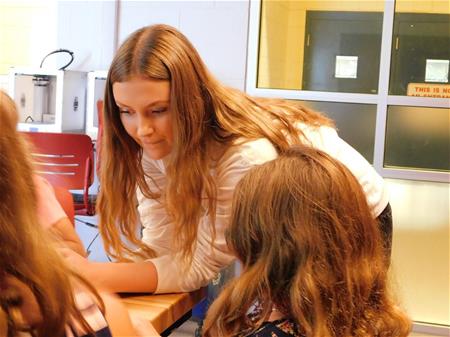
Aug 4, 2022 2022-08 Accountancy Alumni
MakerGirl expands programs, university partnerships post-iVenture
MakerGirl CEO Mary Hadley (’19 LAS) had never taken a business class or worked with a 3D printer when she signed up to travel across the country to teach young girls about the possibilities a career in STEM offers. Five years later, she’s overseeing the exponential growth of the successful startup that was boosted by the iVenture Accelerator, a University-wide incubator that’s powered by Gies College of Business.
“I will never forget this young girl who had decided to make a gavel for her assignment to create an object that represented her future career. She became frustrated because it wasn’t working and scrapped the whole idea,” said Hadley. “She came back with a much bigger idea – the Statue of Liberty. To watch her create something even better from that failure shows the power of MakerGirl. We teach girls not only about computer-aided design and STEM, but also about how to find their confidence.”
This month, MakerGirl is recruiting students and professionals to become part of the ChangeMaker team. New and returning participants are invited to join the organization’s virtual MakerGirl Summit (Sept. 8-9), where ChangeMakers from around the country can connect with the organization’s corporate sponsors for volunteer, professional development, internship, and job opportunities.
MakerGirl also continues to inspire other startups as a featured presenter at last month’s iVenture Demo Day in Chicago, which showcased 16 ventures and 60 student innovators. They are hosting an information session sponsored by MuleSoft on Aug. 19 for students to learn more.
MakerGirl was founded in 2014 by Gies College of Business students Elizabeth Engele (’15 BADM) and Julia Haried Flesher (’15 ACCY, ‘16 MSA). The idea grew out of a social entrepreneurship class and was further launched through iVenture Accelerator with a financial support, mentorship, and a summer at the University’s Research Park. Both women remain on the organization’s board of directors and work for Deloitte as senior consultants focusing on strategic design and innovation. Stephanie Hein (’16 LAS), MakerGirl’s first CEO, also sits on the board.
Engele and Flesher said iVenture allowed them to continue to bring to life their vision for MakerGirl.
“The iVenture Accelerator taught us how to successfully pitch our idea to corporate sponsors, and we learned how to raise money through crowdfunding campaigns, which supported us in making our first MakerGirl Goes Mobile road trip a reality," said Engele.
"Without the support of iVenture in our early years, MakerGirl would not have progressed to become the organization it is today," added Flesher.
Since its inception, MakerGirl has impacted the lives of over 6,000 girls through more than 560 sessions on university campuses and through #MakerGirlGoesMobile road trips in 28 states and four countries. The non-profit shifted to virtual sessions during the pandemic and is set to go back to in-person physical spaces this school year at the University of Illinois, Northwestern University, University of Michigan, and University of Texas at Austin. The goal is for each university academy to conduct six to eight sessions per semester, educating 300 to 400 girls per school year.
 “Our sessions show both the creative and analytical side of STEM," said Hadley. "Students brainstorm ideas and sketch out designs, thinking about how their product could work in their life or an industry. Then, they work on the technical side – tinkering in CAD and executing that idea in a 3D format."
“Our sessions show both the creative and analytical side of STEM," said Hadley. "Students brainstorm ideas and sketch out designs, thinking about how their product could work in their life or an industry. Then, they work on the technical side – tinkering in CAD and executing that idea in a 3D format."
To strengthen the program’s continuity, MakerGirl is shifting its focus to partnering with faculty at universities that have multiple 3D printers and learning facilities.
“This strategy helps us expand our scope and bridge the transition when campus volunteer leaders graduate,” said Hadley, who is also exploring establishing academies in Milwaukee, Boston, and San Francisco.
In 2021, MakerGirl launched additional specialized curriculum for girls in the 11-14 and 15-22 age ranges. Inventive Minds teaches girls to be not only makers, but inventors. They use engineering design principles to create their own project during a five-week session. Its first offering, Game Designer, teaches students how to build their own game board from scratch, giving them the opportunity to research, iterate, and present unique designs. Summer mobile sessions also continue at local libraries and community centers in rural areas and marginalized communities.
“We continue to target younger girls because we’ve found that 10- to 11-years-old is when a lot of girls start to say no to STEM. We want to show them STEM is not only a possibility, but that there’s STEM in every industry—from business to fashion,” said Hadley. “Now we’ve expanded the age range to high school and college students so they can discover how their passions and STEM intersect.”
In Spring 2022, MakerGirl added their third level of programming, Project Engineers, an 8-week session that combines engineering and entrepreneurship principles in a small group setting with 1:1 university mentorship. The non-profit also has begun working directly with corporations such as Motorola, Ardmore Roderick, Uber, and others for session with students from an area school and employees’ children.
“An added benefit of second and third level programs is that they also help to build a community. Girls see women professionals in the STEM space and learn about career opportunities. Adding a continuum of programming also helps us to expand the ChangeMaker volunteer pipeline,” said Hadley, who acknowledges her own MakerGirl journey mirrors those of the girls she hopes to inspire.
“The mentorship from iVenture Accelerator gave me the confidence to take this full-time position and embrace entrepreneurship. We are continuing to grow–adding two more full-time staff members—and are scaling our ideas in a way I never imagined possible,” said Hadley.
